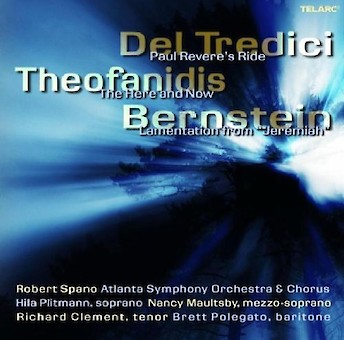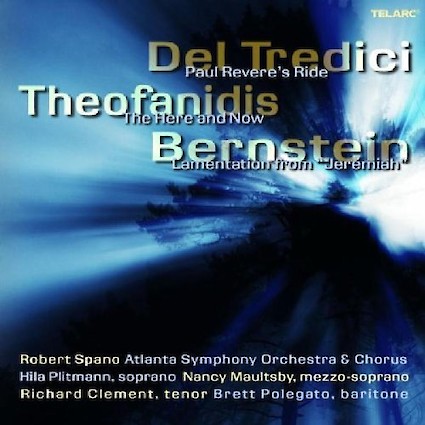I. The Call
II. The Wait
III. The Ride
Finale: Fugue - Chorale - Epilogue
"The fate of a nation was riding that night," observes the innkeeper who, in Longfellow's "The Landlord's Tale" (better known by its subtitle, "Paul Revere's Ride"), recounts for his guests "the midnight ride" that set the American Revolution in motion.
Awareness that our nation's fate was again in jeopardy was very much in mind as I undertook my musical setting of this beloved poem. Like all Americans, I had been shaken by the World Trade Center tragedy. Shaken and more: Living in Greenwich Village, a scant mile and a half from "Ground Zero," I was viscerally affected by the catastrophe and it aftermath. Daylong and nightlong, just a half-block from my home, every manner of recovery vehicle traveled ceaselessly, taking firemen, policemen, demolition crews and other emergency workers to and from the grim site. As well, crowds of people lined the highway "24/7," usually cheering and waking flags, but at times more quietly holding candles. Flags also appeared in many windows, including my own, and I saw that it angered me to see windows without flags. For the first time in my life, I was bursting with a feeling of patriotism — that powerful emotion akin, it seemed, to religious frenzy. (In fact, I emblazoned the first page of my score with the words, "Written in Memory of the Victims of 9/11 — Especially the Firemen.")
In the spring of '02, commissioned to write a series of anthems for unaccompanied treble choir, I first chose "Paul Revere's Ride" for my finale and quickly did a sketch of the music. But then I thought, "This small choir is too limited a resource for such a great poem; this music would explode the treble choir!" So I set the Ride aside and, for the smaller choir, turned to a more modest text.
The following spring, I traveled to Atlanta to hear Robert Spano, soprano Lisa Safer and the Atlanta Symphony perform my Ecstatic Alice. At one point or another, I happened to mention my "Paul Revere" setting to Bob, and in a flash, he said, "I want it!" With a full symphony orchestra, the renowned Atlanta Symphony Chorus and an amplified soprano soloist, I realized I was being offered grand musical forces — resources befitting the subject matter. And thus spurred on, I set about recasting, expanding and orchestrating my Ride — and dedicating the work (naturally enough) to conductor Robert Spano.
The evening's other new work, David Del Tredici's 31-minute "The Ride of Paul Revere," is a dense, humongous, loud, sweet and funny cantata based on the Longfellow poem. Del Tredici, 68, is now a figure in musical history: he has bucked the atonal-music trend in the 1970s with cosmic, tuneful, post-Straussian music, often inspired by "Alice in Wonderland." It was a weird mix, but it worked splendidly. That describes "Paul Revere." The work does almost everything, often with subtle beauty and idiosyncratic wit, or ear-splitting noise.
The other premiere given on the same night was by David Del Tredici, who found himself on that fateful day of September 11, 2001 watching the horror from Greenwich Village. His was suddenly infused with flag-waving ardor, and he even found himself angry with any windows he saw that were not sporting American flags. He had been thinking of setting Longfellow's poem Paul Revere's Ride for a rather small female chorus, but realized that the poem was far too massive for those forces. When Robert Spano, who was programming the composer's Ecstatic Alice in Atlanta, heard about the possible composition, he said "I want it!", and Del Tredici agreed. Hence came into being Paul Revere's Ride, surely destined to become an American classic.
The work is at once a tribute to the patriotism inherent in the poem, and also an affecting memorial to those who died on 9/11, especially the firefighters. It is a breathless, seat-of-your-pants tour-de-force for the chorus (who barely have time to breathe) and a rapid-fire concerto for the orchestra. The music gallops along at a 12/8 pace that puts you on Revere's horse from the first bar and doesn't relent until the entire seacoast has been alerted.
Here too is some fabulous word painting, scored so that Longfellow's tricky, yet vibrant and rhythmical rhymes are presented with complete confidence and communicability. Emotions fly freely and intensely, with over-whelming climaxes and an unerring sense of pacing. This work is without question quintessentially American, felt through and through, and one can think of no better memorial to the 9/11 victims than this positive, life-affirming, and blazingly dashing work. Even the anachronistic elements, like the siren at the beginning, sound just right and contribute to the overall excitement and passion.
Classical music in general, and audiophile label Telarc in particular, scored big in this year's annual Outmusic Awards. Pulitzer Prize-winning composer David Del Tredici, whose music has recently found an ardent champion in conductor Robert Spano, won Outstanding New Recording: Instrumental for the Atlanta Symphony Orchestra's Telarc recording of Paul Revere's Ride.
After living through the horrors of 9/11, New Yorker Del Tredici experienced a spell of patriotism that impelled him to write Paul Revere' Ride. A setting of Longfellow's classic tale for amplified soprano, huge chorus, and every instrument and noisemaker under the sun, this work has received a recording can serve as a test for an audiophile sound system. In fact, one listen to the chorus — spectacular in multichannel SACD — convinced me of the need to adjust positions of my speakers to create better focus.
Always the rogue, Del Tredici indulges in such escapades as a spirited fugue pitting "Rule, Britannia" against "Yankee Doodle," and a rousing theme, complete with wind machine and sirens, that continually gallops through one's head. After you hear its gorgeous chorale and the triumphant, joy-filled ending, in which the composer pulls out all the stops, you may agree that Paul Revere's Ride is a trip and a half.
In a telephone interview, Del Tredici described his Outmusic Awards win "amidst a sea of pop artists" as "thrilling beyond my wildest dreams." He also rejoiced in the fact that, through the awards process, he met Melissa Fogarty, who has since demonstrated her versatility by sight-reading Del Tredici's outrageous Ms. Inez Sez (CRI Records), complete with a high E, in live performance.
"Listen my children, and you shall hear/Of the midnight ride of Paul Revere," begins Hendry Wadsworth Longfellow's poem The Landlord's Tale — much better known by its subtitle, Paul Revere's Ride. David Del Tredici has scores a decisive hit with his hew setting for soprano, orchestra, and chorus of this beloved poem. Robert Spano conducted the Atlanta Symphony Orchestra and Chorus in the work's premiere last May, with Hila Plitmann as the soprano, and then recorded t for Telarc. The resulting disc (Telarc 80638), released in October, has earned glowing reviews, and was nominated for a Grammy in 2006 for Best New Classical Composition.
Gramophone magazine designated the disc an "Editor's Choice" selection for December 2005: "[Del Tredici] wrote the work in the aftermath of 9/11, when for the first time in his life, he found himself 'bursting with a feeling of patriotism.' The connection between Revere's heroism of 1775 and that displayed by so many in September 2001 is established in the work's wailing fire sirens, among many other astonishing and vibrant musical elements. It is truly a tour de force, and a piece which, like all great art, reveals more and more of itself upon repeated listenings. Hila Plitmann is the soprano for whom the piece was written, and her amazing vice rivets the listener."
Recordings (1)


Paul Revere's Ride
2006, Telarc (CD-80638)Works
Performers
- Robert Spano, Conductor
- Hila Plitmann, Soprano
- Atlanta Symphony Orchestra and Chorus